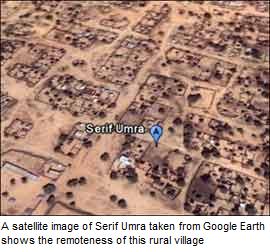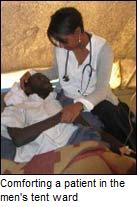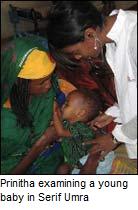|
In a make-shift hospital in a dusty rural town in Africa's unforgiving Sahara desert a Johannesburg-born doctor, Prinitha Pillay worked tirelessly to aid a community ravaged by decades of conflict.
Sudan and its war-stricken region Darfur have dominated the headlines since 2003 when fresh conflict erupted, shortly after two devastating decades of civil war. The UN believes that this conflict has left 2 million people displaced, and another 200,000 dead. In July of this year, the southern region of the country became independent and is now known as South Sudan. But despite these political advances, the country's infrastructure is all but ruined, and many thousands of people are still displaced after the long-lasting conflict. In 2007, on assignment with Médecins Sans Frontières, (MSF or "Doctors without Borders") a humanitarian medical organisation that provides medical assistance to all in need, Prinitha found herself in Serif Umra, a rural village in the north-west region of war-torn Sudan. The hospital comprised of a few brick buildings and some tents - no electricity, no running water – from which she, and her medical team (a nurse and midwife) served a community of around 135,000 people. "We also had national staff that kept the dispensary going – five medical assistants who were able to prescribe drugs with some, but limited, training," explains Prinitha. Her six-month assignment started in November 2007 and she returned home in May of 2008.
Why she did it? "I realised that the middle-of-nowhere is somewhere for someone," is her automatic answer to this. She admits that growing up in Lenasia, south of Johannesburg, during the Struggle-years has heightened her sense of social responsibility. "It's about really living in the world and not experiencing it as just another tourist," she explains. Here's how Prinitha put it in her blog: "Darfur is a place on the border of being forgotten…and I knew it was important to be there, to be that witness". "The principles and values of MSF are very closely tied to to those that inspired me to become a doctor - the alleviation of human suffering, protection of life and health and the restoring and ensuring deference for human beings and their basic human rights."
Medical challenges This, however, is where her background experience came through. This Wits-trained doctor has had lots of experience working in resource-constrained settings, ranging from provincial and district hospitals in SA, to mountain clinics in Lesotho. And she has even had short stints in India and southern Sudan. Malaria, upper- and lower respiratory tract infection, dysentery and malnutrition – diseases that come in the wake of civil conflict – were the most common conditions ailing the Serif Umra community. Then there were the injuries: some accidental ("like when someone fell off the donkey"), others conflict-related (gunshot and burn wounds). Here are some extracts from her blog describing her experiences during her stay in Serif Umra:
25 February 2008 - Meningitis takes its toll… I fall asleep when I get called again to the ward for two babies, both facing their first six months of life. The odds were against these babies. One had a bulging fontanelle (the diamond shaped gap in the bones on the top of the skull all babies are born with), fever and was having seizures. He was gasping for something, and air, I suspect, was not it. His gasps were his farewell words to his parents and his limp decrepit senile seen-it-all grandfather who had that look in his eyes…
28 February 2008 - Cold, hard and cheerless
6 March 2008 - IDPs
14 March 2008 - The burns of a family Amazing they uttered not a single word in the five hours that Jens (the nurse) and I peeled away their skin like a boiled potato and dressed their wounds. No "oohs", no "aaahs", not a word. The couple's baby sustained 99% burns and passed away soon after it was brought to hospital by a neighbour.
14 April 2008 – Hunger gap Our Therapeutic Feeding Centre is within walking distance and we have a cadre called a Home Visitor who visits each household at least once a week, to provide information and screen the kids to pick up the ones that have tipped from healthy to malnourished. We provide Plumpy to the bambino and food ration of sorghum, lentils, oil, salt for families who are in the nutritional programme so that we help not just the ones already afflicted, but hopefully its siblings too. I talk about what we do, but it's meeting a 3-year-old girl in our Therapeutic Feeding Programme who walked 40km for her weekly ration, that's when I realise her efforts cannot go unrecognised or acknowledged. All the babies dying Prinitha admits that the work is "exhausting", "intense" and "challenging", but in the same breath insists that there is nothing better for her. "It is such good work," she says, adding that it really refines your skills as a doctor. What really got to her though, were "all the babies dying", she admitted regretfully. "For me it is clear that the women and kids are most affected by the conflict – they are the ones doing the labour, struggling to find food and trying to survive." But it is in the face of suffering where Prinitha found her place. "With MSF I realised it was less and less about me. When I was giving more than I was taking, I was so much happier." Prinitha is currently in South Africa working in a clinic in Khayelitsha, waiting for details of her next MSF adventure. (Wilma Stassen, Health24, November 2008) - Updated August 2011
Read more: |




 Publications
Publications
 Partners
Partners


















